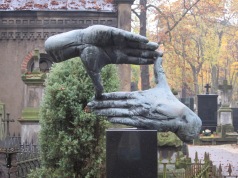• Bogusław Schaeffer, b. 6 June 1929
Friday, 6 June 2014 Leave a comment
There are few Polish composers still alive who were born before 1930. Włodzimierz Kotoński (b. 1923) and Jan Krenz (b. 1926) are two of them. Kotoński is additionally significant as an author and as a teacher of subsequent generations of Polish composers. Krenz is primarily known as a conductor and champion of music by his compatriots. Bogusław Schaeffer (born on this day 85 years ago), however, has even more strings to his bow. He is an artist, dramatist and author, as well as a composer and teacher.
I first came across Schaeffer’s music at the 1970 ‘Warsaw Autumn’ festival (the premiere of Quatuor SG by Zygmunt Krauze’s Music Workshop) and at the following year’s festival (the premiere of Heraklitiana by the harpist Urszula Mazurek). Little did I realise when, a week or so later, I took the train to Kraków to study at the PWSM (State Higher School of Music) that I would spend seven fascinating months as his composition student.
We were like chalk and cheese in our musical tastes. I was wet behind the ears, he was a polymath on contemporary music and performance practice. He could not have been kinder. He introduced me to a huge range of technical and notational devices and encouraged me to experiment, test and investigate. His energy and restless imagination were incredibly stimulating. Among the pieces that I wrote was a work for solo harp that Urszula Mazurek played at the 1976 ‘Warsaw Autumn’. But in truth little else of substance emerged, not least because I was using the time also to get to know music by other Polish composers and to begin to build up my now extensive library of Polish music and, as a sideline, of Polish posters.
The main lesson for me was that there were huge positives to be gained by studying with a composer with diametrically opposite aesthetics. It was not that I sensed no contact – far from it. When I returned to the UK I took up a lectureship at Queen’s University, Belfast, where amongst other Polish repertoire I gave regional premieres of some of Schaeffer’s piano music, including the famous Nonstop (1960), as well as his music-theatre piece, TIS MW2 (1963). But my own compositional interests lay elsewhere, with Witold Lutosławski and Henryk Mikołaj Górecki. And it then emerged that neither of these composers had much time for Schaeffer. That did not in itself affect my view of or relationship with Schaeffer. I helped him with the text of his massive tome, Introduction to Composition (1976), and met up with him on many subsequent occasions, not least at an American School seminar in Salzburg at Easter 1976.
Yet there is no hiding the fact that Schaeffer has been a controversial figure in Polish music. He has been regarded as a charlatan by some, an error-strewn analyst of contemporary scores by others. His custom of working on several works at the same time no doubt accounts for his enormous output of well over 1000 creations across different media. The sheer imagination of his new notational schemata beggars belief, while his ‘happenings’ and music-theatre pieces are often outlandish and/or extremely funny. His visual art, closely linked with his graphic notation, is never less than colourful and vital, while his several dozen theatre pieces are hugely popular in Poland and reach a quite different audience than his musical works.
Although Schaeffer remains outside the mainstream of Polish musical life (he has lived in Austria for several decades), he has a devoted following there and abroad who relish the wild, unpredictable character of his creative imagination. Like a number of other figures (Cage and Kagel come to mind), his presence is felt in performance and as a challenger of norms, although the corollary of this is that it has been hard to find conventional audio examples of his music. The exception comes from the ever-resourceful Bôłt Records, whose double CD of Schaeffer’s music, ‘Assemblage’, contains several works and a couple of others may be found elsewhere on Bôłt compilations. The advent of YouTube, however, has given his output a new lease of life, and there is selection of his music also on last.fm.
There are also online articles (a brief selection below) and I have added two passages on Schaeffer from my book Polish Music since Szymanowski (CUP, 2005).
• Bogusław Schaeffer. Biography (2002)
• Adrian Thomas, Polish Music since Szymanowski (2005)
• Edinburgh International Conference Centre, Bogusław Schaeffer, Music and Graphics (2010, including sound files)
• Magda Romańska, Bogusław Schaeffer: Poland’s Renaissance Man (2012)
• Alena Aniskiewicz, Bogusław Schaeffer: An Anthology (2013, review of four plays in English translation)
So, on this his 85th birthday, I send my former teacher all best wishes for this significant milestone, with huge thanks for his generosity of spirit, our walks in the Planty in foggy Kraków, and great memories of invigorating composition lessons. Sto lat! Sto lat! Niech żyje, żyje nam!

